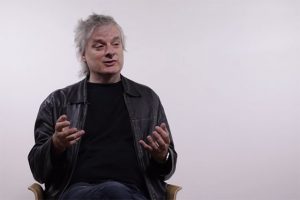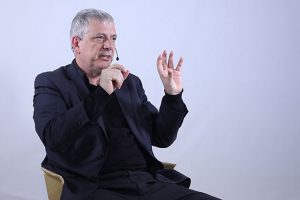Artificial Consciousness
Philosopher David Chalmers on artificial intelligence in movies, consciousness of computers and moral rights o...
Philosophy of economics is a rather odd subject matter, because in many ways it is a three subject matters. There are three areas in which philosophy and economics as there are done today heavily overlap. First of all, there are questions related to philosophy of science – it is economics of science, how does it explain things, why is it that it is not as successful as other sciences, and indeed general questions about whether a science of human beings, of society is possible in the same way as we can have a science of physics or chemistry. Second area of overlap is normative, ethical. We are certainly concerned about how to make people’s lives better. Economics is clearly very important to how well people live, and there is a real question about whether economics as a science can be divorced from moral questions concerning human wellbeing, what are the proper social policies to be followed. The third area of overlap is much more recent than the others and that concerns the theory of rationality, because contemporary economics is really built around a theory of rationality and the model, or the picture of human beings that economists rely on is a picture of human beings as rational, where rationality is understood in a formal, or, rather, narrow way.
Traditionally, philosophy of economics really goes back to the beginning of modern economics, what can be found in Adam Smith’s reflections on a nature of what he is doing. The first really systematic reflection on the nature of economics was in the 1830s in England, and economist, who is now not perfectly known by the name of Nassau Senior and then a very great economist and philosopher John Stuart Mill wrote on the scientific methodology of economics and also a bit on the relationship between economics and ethics, the issues about rationality do not arise until modern times. I personally have been very influenced by Mill’s views, which, I think, with some adaptation, are still the best views. Mill was famous for being a very strict empiricist and what I mean by that is in Mill’s view, all of our knowledge about the world comes through our senses. He believed that even our knowledge of truth of arithmetic (one plus one equals two) is a matter of looking at one, looking at one and saying that it is two, which seems somewhat silly, it seems as if the way we understand arithmetic is a little different than through observation, but Mill was very much an empiricist.
If you look at contemporary economics, the casual factors are basic claims about rationality, claims that consumers want more goods rather than fewer goods, claims that those who are in charge of businesses want larger net returns and suppose to have smaller net returns, and we put all those things together deductively. If you study contemporary economics, it is a very mathematical science, and then, hopefully, we get a little bit of control over understanding what actually goes on in the world, because we are simplifying so much and leaving out so many relevant casual factors. As I said, I really think that is the right way to look at economic methodology, right way to understand why economics is, with respect to certain phenomena, of limited use, because the subject matter is just too complicated. To give an analogy, if you ask physicists to explain exactly where leaves will fall from the tree, when it is windy and there are various shapes of buildings around it, physicist will say that is not what we can do, we will tell you how a leaf will fall in a vacuum, and, similarly, economists, what we are asking from them is analogous to what we would be asking the physicist who would be predicting where leaves would fall. So we have to lower our expectations of economics, but it does not mean that it is worthless, it can capture the main causes and give us, in many cases, an ability to make a sort of general qualitative predictions about how phenomena will go. Although I think that is useful and correct, it does not answer all the questions that we have, especially given the current world where there are economic problems to be found pretty much everywhere.
For the economies that are really booming and flourishing you have to look really hard right now. I gather, the problems in Russia, there are certainly problems in the United States, Europe is a mess, it looks as if the Chinese are going to be in trouble, and so we have these very pressing questions concerning how to direct the overall economy, so called “macroeconomics”. The claim that we could capture how things work with a few casual factors – that does not seem satisfactory, we really want some guidance in terms of policy. I think, the main contemporary methodological problems, one finds there tremendous disagreements among the leaders of the economics profession, at least, within the United States, I am not familiar with economists in Russia, with some of them being very insistent on something like Mill’s methodology, although they do not describe it this way. What we really need to do is start from fundamentals, basic causal claims about how individuals make choices and then derive our views of how the economy as a whole works from claims about individual choices and, of course, we cannot do that accurately. Then, there are massive assumptions that need to be made, for example, let’s think of the economy as if it were governed by the choice of a single representative agent who lived forever. Well, clearly, there is no such thing. Whether that is a useful device to understand how the economy as a whole, works, is very controversial.
Before I close, I should say a couple things about the other two areas of overlap between the economics and philosophy, concerning rationality and ethics. The issues concerning rationality probably are a bit too complicated to talk about in just a few minutes, so, I suppose, the best thing for me is simply not to try. With respect to ethics, a lot of what economists do is attempt to guide policy, and they do it by inferring from the choices that people make when they buy and sell things what kinds of things they want, what kinds of things they prefer, and they see economics as aiming to satisfy people’s preferences and in satisfying people’s preferences to make them better off. So there is a commitment to the view that we can determine what is good for people by seeing what people want. That is sensible, if you don’t take it too far. All of us, reflecting on the past, know that there were times that we wanted things that turned out not to be good for ourselves and, certainly, if we look at our children, we can often see that they want things that are not good for themselves, and so the view that whatever people want is going to benefit themselves, is clearly an oversimplification. It may be a very useful one for some of the purposes that economists have, but it is clearly going to make welfare economics, the attempt to use economics to promote people’s welfare, a very questionable enterprise, and many philosophers, including myself, have been concerned about how to improve welfare economics, how to lessen the dependence that economists have on this identification of whatever satisfies people’s preferences as being whatever is good for people.

Philosopher David Chalmers on artificial intelligence in movies, consciousness of computers and moral rights o...

Economist Sacha Bourgeois-Gironde on decision making in economics, 'Allais paradox' and perception of reward

Economist Deirdre McCloskey on fundamental human virtues, their secular interpretation and necessary applicati...